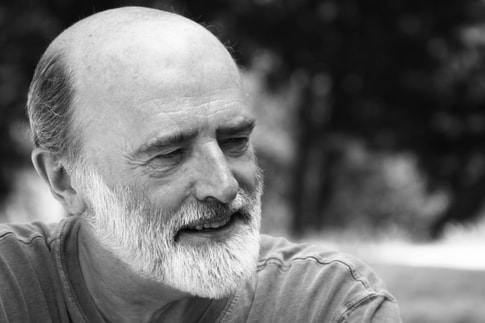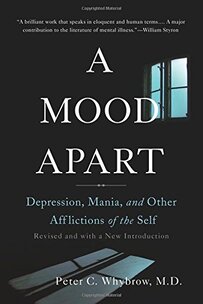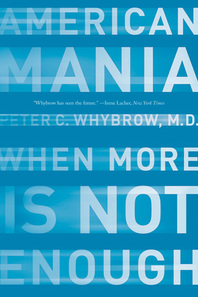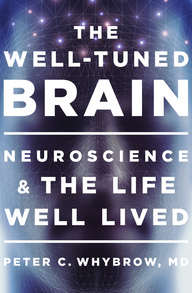
Books to Challenge and Inform....
First, let me introduce myself. I am a physician - a psychiatrist and a neuroscientist - who has been privileged, over the course of my career to work in academic centers in both England and the United States. My formal research has been in endocrinology, seeking to better understand the inter-relationship among thyroid hormones, behavior, and disorders of mood. The trilogy of books described here grew initially from both that research and from my experience as a physician. The stories the books tell, however, are also influenced by my experience as a migrant and my admiration for America's bold cultural experiment. The United States, with its self-styled exceptionalism and historical pursuit of a Manifest Destiny, is an adventure that owes much to the European Enlightenment. But the adventure is also a cautionary tale for our times. After a century of extraordinary material advance and the achievement of world hegemony, Americans now find themselves in a turbulent, reflective, mood. The world order is changing, and the climate too. The challenges we face go far beyond America's shores, posing important questions for our species -- about human behavior, our evolutionary roots, and how we should conduct ourselves as creatures dominant on this planet. It is time, once again, for America to lead.....
The Future is ours to Imagine....Welcome to The Anthropocene....We live now in The Age of Man
First, let me introduce myself. I am a physician - a psychiatrist and a neuroscientist - who has been privileged, over the course of my career to work in academic centers in both England and the United States. My formal research has been in endocrinology, seeking to better understand the inter-relationship among thyroid hormones, behavior, and disorders of mood. The trilogy of books described here grew initially from both that research and from my experience as a physician. The stories the books tell, however, are also influenced by my experience as a migrant and my admiration for America's bold cultural experiment. The United States, with its self-styled exceptionalism and historical pursuit of a Manifest Destiny, is an adventure that owes much to the European Enlightenment. But the adventure is also a cautionary tale for our times. After a century of extraordinary material advance and the achievement of world hegemony, Americans now find themselves in a turbulent, reflective, mood. The world order is changing, and the climate too. The challenges we face go far beyond America's shores, posing important questions for our species -- about human behavior, our evolutionary roots, and how we should conduct ourselves as creatures dominant on this planet. It is time, once again, for America to lead.....
The Future is ours to Imagine....Welcome to The Anthropocene....We live now in The Age of Man
A Trilogy of Books....
"Reason," pronounced David Hume in 1738, is "the slave of the passions." Over a century later, Vincent van Gogh, riding the roller-coaster moods of manic-depression, readily agreed. “Emotions are the captains of our lives,” he wrote to his brother, Theo, in 1889. It remains so today. The capacity for emotion is wired into the old human brain, a pre-verbal means of communication expressed through the muscles of the face. As Darwin described in The Expression of Emotions in Man and Animals, it’s an ability we share with other social creatures, including the family dog. But also, unique among the animals, the human brain is endowed with an extraordinary capacity for reason. We are Homo sapiens - the wise ones. Thus to fathom why we humans behave as we do it is critical to understand both emotion and reason, how and why these qualities of mind are shaped by biology, experience and culture, and how these elements meld and compete in life to determine our temperament, our habits, and the choices we make. To choose how to live we must know who we are.
This, in a nutshell, is what this trilogy of books is about. I begin, with A Mood Apart, by exploring those disorders of mood that magnify the emotional swings that we all experience. These are the “afflictions of the self” that increasingly touch us all, disturbing the essential barometer of everyday life. Through the personal stories of those who have suffered I explain how our brains “work” and our lives “feel” in illness and in recovery, illustrating how reason and emotion shape both who we are and the culture in which we find ourselves.
This, in a nutshell, is what this trilogy of books is about. I begin, with A Mood Apart, by exploring those disorders of mood that magnify the emotional swings that we all experience. These are the “afflictions of the self” that increasingly touch us all, disturbing the essential barometer of everyday life. Through the personal stories of those who have suffered I explain how our brains “work” and our lives “feel” in illness and in recovery, illustrating how reason and emotion shape both who we are and the culture in which we find ourselves.
In modern times disorders of mood are increasingly prevalent across the world, among both rich and poor nations. And despite its economic hegemony, the United States is a leader in this dysphoria, with its citizens suffering epidemic rates of stress, obesity, addiction, anxiety and depression. While exhibiting an astonishing appetite for the material life many Americans feel overworked and dissatisfied. Three decades of increasing national wealth have not equated with increased well-being. In American Mania I ask why this should be. Why is more not enough? What role does the migrant temperament play in the creation of America’s laissez-faire, competitive, free-market culture where only more is better? Is human biology equipped to cope with the demands of the 24/7, information-saturated, time-starved global culture that we have created for ourselves? In the face of the seductive opportunities of the consumer society is passion again outrunning reason? Have we lost the capacity for self-command and with it a balanced understanding of ourselves? In our craving for more have we become enslaved to an addictive vortex of our own creation, with detriment to our personal health and to the health of the ecology that supports us? As a nation, and across the world, these are the challenges that we face in the Anthropocene, in The Age of Man
In the last of the trilogy, The Well-Tuned Brain, I seek to answer these questions and to construct a sustainable way forward, both for ourselves and for the planet that is our crucible and home. In the first half of the book, exploring from the perspective of behavioral neuroscience, I ask once more the perennial question, "Who do you think you are?" Why are we so fascinated by technology and market competition? What are the roots of the modern market society? What has driven our transition from citizen to consumer? Why, I ask, is money so important. In answer I begin at the beginning, for the key to the puzzle is to be found in the market place of the brain: how habits are formed and choices are made. Further questions follow, of course, and are addressed in the second half of book. Based upon ancient wisdom, enhanced in recent times, by insights gleaned from behavioral neuroscience, I explore “How best to live.” How may we better balance emotion and reason to our personal benefit and to the common good? Careful analysis suggests that today in America - distracted and confused as we are by the time-starved, demand driven frenzy that serves for human existence - that there is much that we have forgotten about ourselves. I assert, however, that all is not lost: drawing upon real life stories I illustrate how, even in times of frenzy and doubt, we retain an extraordinary capacity for love and trust, for creating healthy habitat and for growing healthy food, for imagination, artistry, and for the accumulation of wisdom. In short, even in these challenging times optimism should prevail: the qualities that sustain our humanity are also the signature behaviors of our success as a species. When deciding how to live - in "re-tuning" for a humane, sustainable, future - we do not start from scratch.
Click on a book image for more detailed description



